Analyzing Customer Loyalty Factors: A Morrisons, UK Perspective
VerifiedAdded on 2020/02/12
|13
|3518
|106
Report
AI Summary
This report analyzes the factors that influence customer loyalty, focusing on the case of Morrisons in the UK. The study begins with an introduction to the competitive business landscape and the shift from transactional to relationship marketing, emphasizing the importance of customer loyalty for business success. The research aims to analyze these factors, understand the significance of customer loyalty within Morrisons, and recommend strategies for enhancing it. A literature review explores factors impacting customer loyalty, including the core offer, satisfaction, convenience, customer service, personal relationships, and reputation. The report also examines the importance of customer loyalty, highlighting its role in repeat purchases, customer recommendations, reduced support needs, price insensitivity, brand ambassadorship, and valuable feedback. The research methodology employs a descriptive research design using an inductive research approach and an interpretivism philosophy. Data collection methods include primary and secondary data sources. The report investigates the factors affecting customer loyalty, the importance of customer loyalty, and how to retain and enhance customer loyalty at Morrisons.
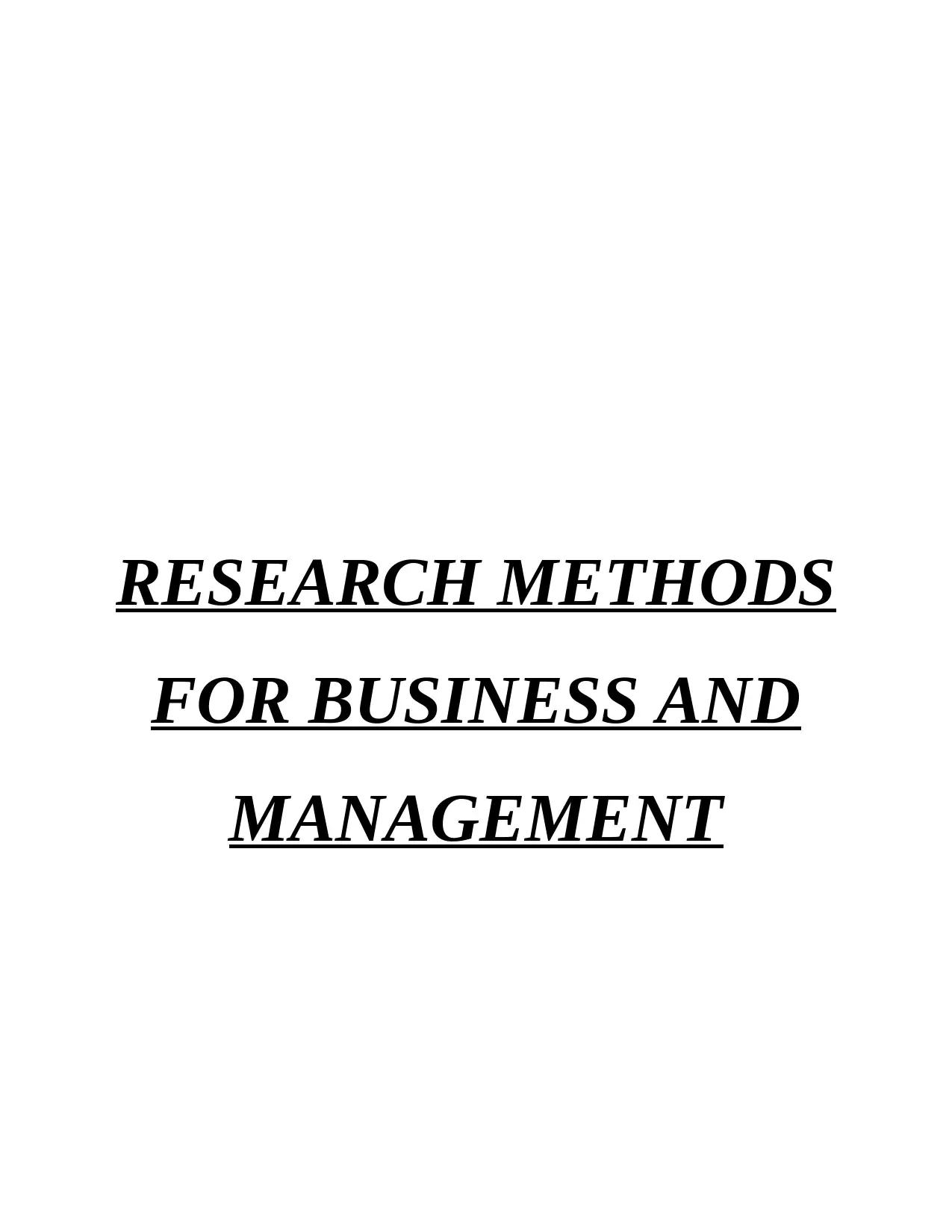
RESEARCH METHODS
FOR BUSINESS AND
MANAGEMENT
FOR BUSINESS AND
MANAGEMENT
Paraphrase This Document
Need a fresh take? Get an instant paraphrase of this document with our AI Paraphraser
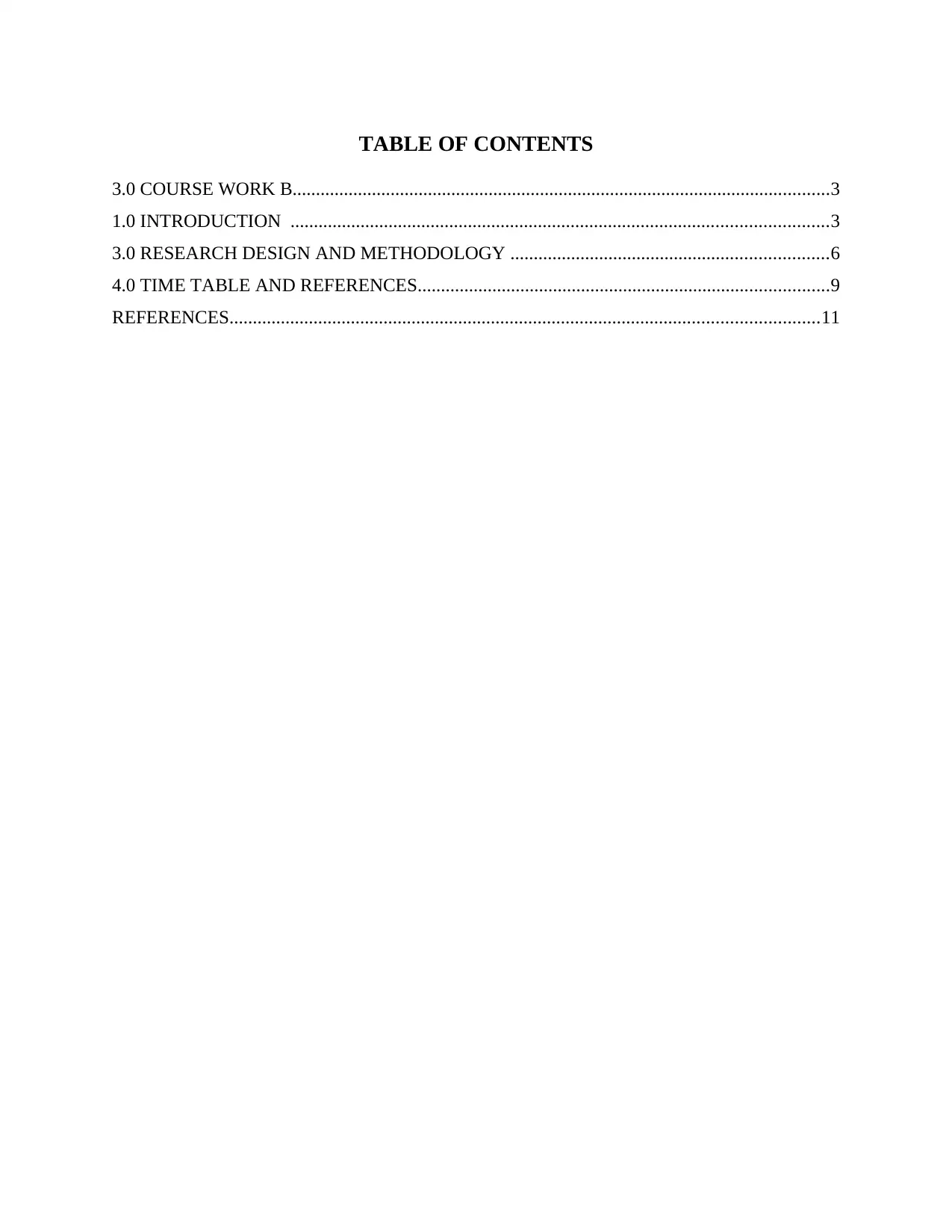
TABLE OF CONTENTS
3.0 COURSE WORK B...................................................................................................................3
1.0 INTRODUCTION ...................................................................................................................3
3.0 RESEARCH DESIGN AND METHODOLOGY ....................................................................6
4.0 TIME TABLE AND REFERENCES........................................................................................9
REFERENCES..............................................................................................................................11
3.0 COURSE WORK B...................................................................................................................3
1.0 INTRODUCTION ...................................................................................................................3
3.0 RESEARCH DESIGN AND METHODOLOGY ....................................................................6
4.0 TIME TABLE AND REFERENCES........................................................................................9
REFERENCES..............................................................................................................................11
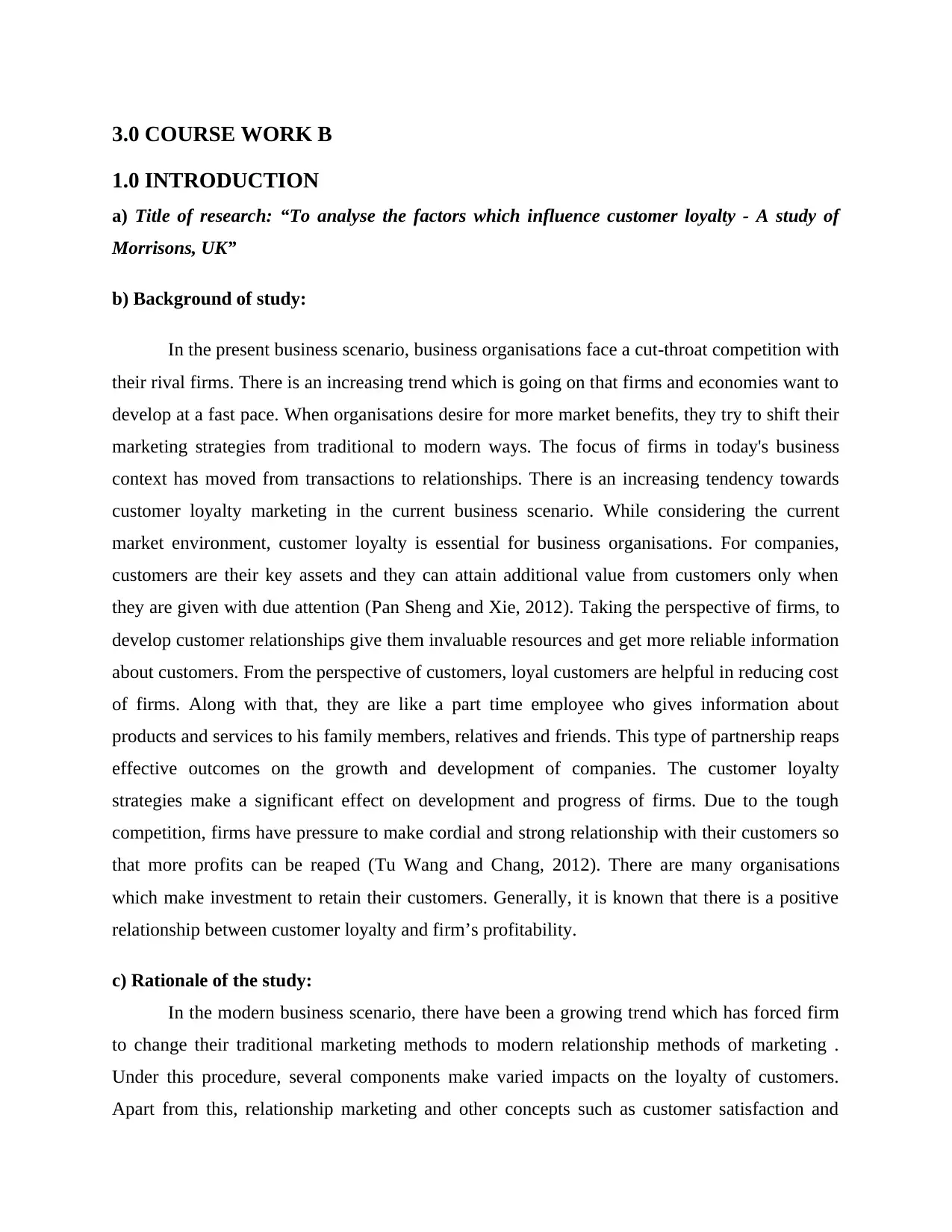
3.0 COURSE WORK B
1.0 INTRODUCTION
a) Title of research: “To analyse the factors which influence customer loyalty - A study of
Morrisons, UK”
b) Background of study:
In the present business scenario, business organisations face a cut-throat competition with
their rival firms. There is an increasing trend which is going on that firms and economies want to
develop at a fast pace. When organisations desire for more market benefits, they try to shift their
marketing strategies from traditional to modern ways. The focus of firms in today's business
context has moved from transactions to relationships. There is an increasing tendency towards
customer loyalty marketing in the current business scenario. While considering the current
market environment, customer loyalty is essential for business organisations. For companies,
customers are their key assets and they can attain additional value from customers only when
they are given with due attention (Pan Sheng and Xie, 2012). Taking the perspective of firms, to
develop customer relationships give them invaluable resources and get more reliable information
about customers. From the perspective of customers, loyal customers are helpful in reducing cost
of firms. Along with that, they are like a part time employee who gives information about
products and services to his family members, relatives and friends. This type of partnership reaps
effective outcomes on the growth and development of companies. The customer loyalty
strategies make a significant effect on development and progress of firms. Due to the tough
competition, firms have pressure to make cordial and strong relationship with their customers so
that more profits can be reaped (Tu Wang and Chang, 2012). There are many organisations
which make investment to retain their customers. Generally, it is known that there is a positive
relationship between customer loyalty and firm’s profitability.
c) Rationale of the study:
In the modern business scenario, there have been a growing trend which has forced firm
to change their traditional marketing methods to modern relationship methods of marketing .
Under this procedure, several components make varied impacts on the loyalty of customers.
Apart from this, relationship marketing and other concepts such as customer satisfaction and
1.0 INTRODUCTION
a) Title of research: “To analyse the factors which influence customer loyalty - A study of
Morrisons, UK”
b) Background of study:
In the present business scenario, business organisations face a cut-throat competition with
their rival firms. There is an increasing trend which is going on that firms and economies want to
develop at a fast pace. When organisations desire for more market benefits, they try to shift their
marketing strategies from traditional to modern ways. The focus of firms in today's business
context has moved from transactions to relationships. There is an increasing tendency towards
customer loyalty marketing in the current business scenario. While considering the current
market environment, customer loyalty is essential for business organisations. For companies,
customers are their key assets and they can attain additional value from customers only when
they are given with due attention (Pan Sheng and Xie, 2012). Taking the perspective of firms, to
develop customer relationships give them invaluable resources and get more reliable information
about customers. From the perspective of customers, loyal customers are helpful in reducing cost
of firms. Along with that, they are like a part time employee who gives information about
products and services to his family members, relatives and friends. This type of partnership reaps
effective outcomes on the growth and development of companies. The customer loyalty
strategies make a significant effect on development and progress of firms. Due to the tough
competition, firms have pressure to make cordial and strong relationship with their customers so
that more profits can be reaped (Tu Wang and Chang, 2012). There are many organisations
which make investment to retain their customers. Generally, it is known that there is a positive
relationship between customer loyalty and firm’s profitability.
c) Rationale of the study:
In the modern business scenario, there have been a growing trend which has forced firm
to change their traditional marketing methods to modern relationship methods of marketing .
Under this procedure, several components make varied impacts on the loyalty of customers.
Apart from this, relationship marketing and other concepts such as customer satisfaction and
⊘ This is a preview!⊘
Do you want full access?
Subscribe today to unlock all pages.

Trusted by 1+ million students worldwide
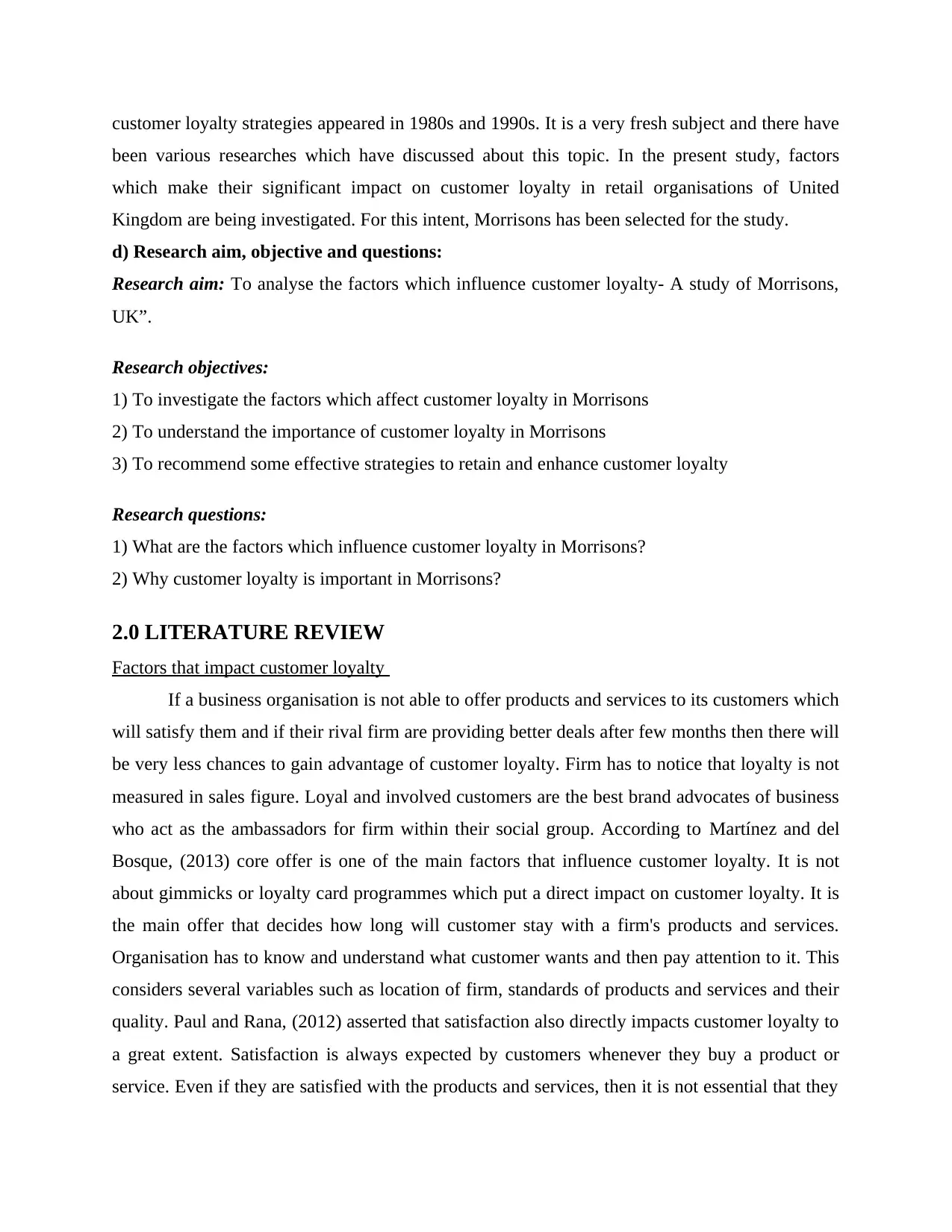
customer loyalty strategies appeared in 1980s and 1990s. It is a very fresh subject and there have
been various researches which have discussed about this topic. In the present study, factors
which make their significant impact on customer loyalty in retail organisations of United
Kingdom are being investigated. For this intent, Morrisons has been selected for the study.
d) Research aim, objective and questions:
Research aim: To analyse the factors which influence customer loyalty- A study of Morrisons,
UK”.
Research objectives:
1) To investigate the factors which affect customer loyalty in Morrisons
2) To understand the importance of customer loyalty in Morrisons
3) To recommend some effective strategies to retain and enhance customer loyalty
Research questions:
1) What are the factors which influence customer loyalty in Morrisons?
2) Why customer loyalty is important in Morrisons?
2.0 LITERATURE REVIEW
Factors that impact customer loyalty
If a business organisation is not able to offer products and services to its customers which
will satisfy them and if their rival firm are providing better deals after few months then there will
be very less chances to gain advantage of customer loyalty. Firm has to notice that loyalty is not
measured in sales figure. Loyal and involved customers are the best brand advocates of business
who act as the ambassadors for firm within their social group. According to Martínez and del
Bosque, (2013) core offer is one of the main factors that influence customer loyalty. It is not
about gimmicks or loyalty card programmes which put a direct impact on customer loyalty. It is
the main offer that decides how long will customer stay with a firm's products and services.
Organisation has to know and understand what customer wants and then pay attention to it. This
considers several variables such as location of firm, standards of products and services and their
quality. Paul and Rana, (2012) asserted that satisfaction also directly impacts customer loyalty to
a great extent. Satisfaction is always expected by customers whenever they buy a product or
service. Even if they are satisfied with the products and services, then it is not essential that they
been various researches which have discussed about this topic. In the present study, factors
which make their significant impact on customer loyalty in retail organisations of United
Kingdom are being investigated. For this intent, Morrisons has been selected for the study.
d) Research aim, objective and questions:
Research aim: To analyse the factors which influence customer loyalty- A study of Morrisons,
UK”.
Research objectives:
1) To investigate the factors which affect customer loyalty in Morrisons
2) To understand the importance of customer loyalty in Morrisons
3) To recommend some effective strategies to retain and enhance customer loyalty
Research questions:
1) What are the factors which influence customer loyalty in Morrisons?
2) Why customer loyalty is important in Morrisons?
2.0 LITERATURE REVIEW
Factors that impact customer loyalty
If a business organisation is not able to offer products and services to its customers which
will satisfy them and if their rival firm are providing better deals after few months then there will
be very less chances to gain advantage of customer loyalty. Firm has to notice that loyalty is not
measured in sales figure. Loyal and involved customers are the best brand advocates of business
who act as the ambassadors for firm within their social group. According to Martínez and del
Bosque, (2013) core offer is one of the main factors that influence customer loyalty. It is not
about gimmicks or loyalty card programmes which put a direct impact on customer loyalty. It is
the main offer that decides how long will customer stay with a firm's products and services.
Organisation has to know and understand what customer wants and then pay attention to it. This
considers several variables such as location of firm, standards of products and services and their
quality. Paul and Rana, (2012) asserted that satisfaction also directly impacts customer loyalty to
a great extent. Satisfaction is always expected by customers whenever they buy a product or
service. Even if they are satisfied with the products and services, then it is not essential that they
Paraphrase This Document
Need a fresh take? Get an instant paraphrase of this document with our AI Paraphraser
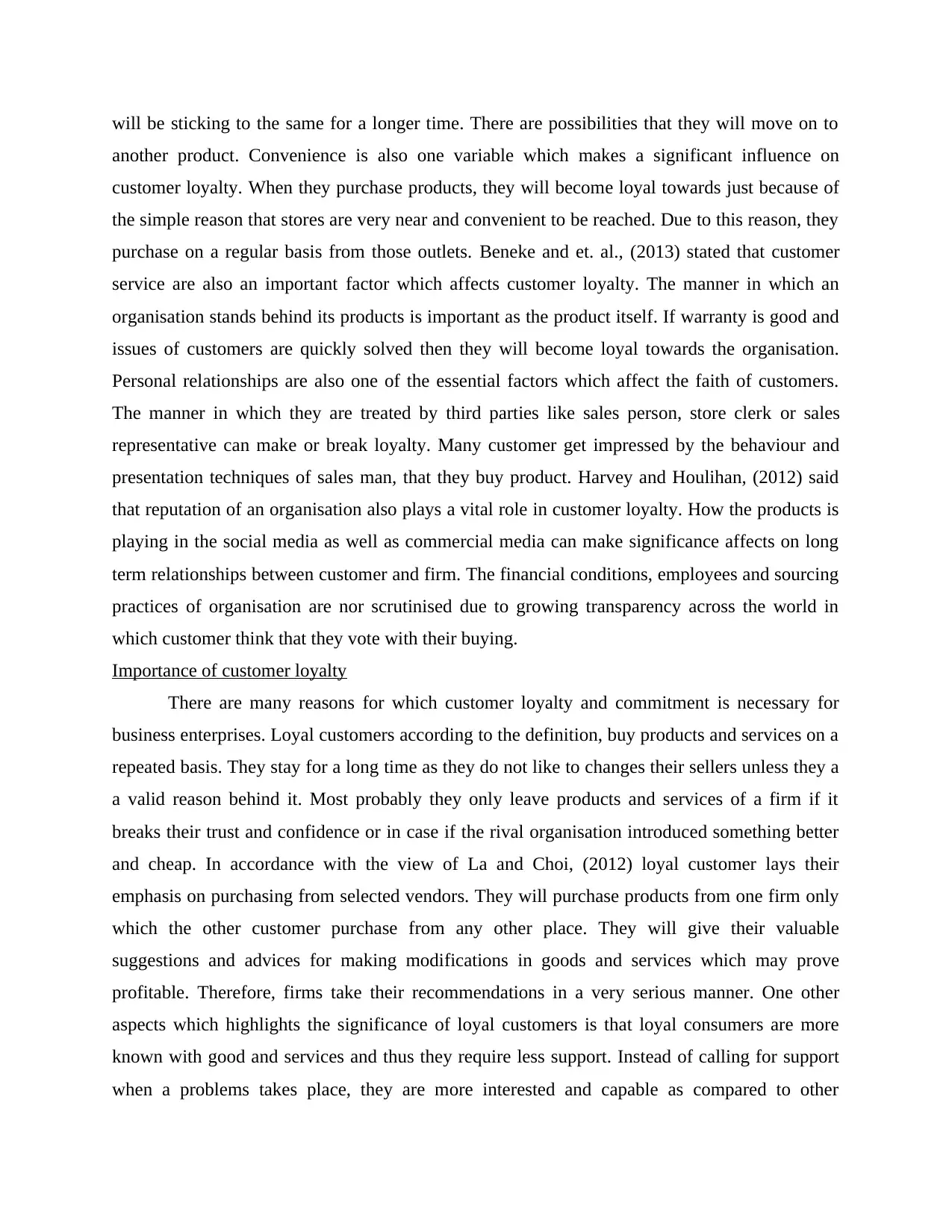
will be sticking to the same for a longer time. There are possibilities that they will move on to
another product. Convenience is also one variable which makes a significant influence on
customer loyalty. When they purchase products, they will become loyal towards just because of
the simple reason that stores are very near and convenient to be reached. Due to this reason, they
purchase on a regular basis from those outlets. Beneke and et. al., (2013) stated that customer
service are also an important factor which affects customer loyalty. The manner in which an
organisation stands behind its products is important as the product itself. If warranty is good and
issues of customers are quickly solved then they will become loyal towards the organisation.
Personal relationships are also one of the essential factors which affect the faith of customers.
The manner in which they are treated by third parties like sales person, store clerk or sales
representative can make or break loyalty. Many customer get impressed by the behaviour and
presentation techniques of sales man, that they buy product. Harvey and Houlihan, (2012) said
that reputation of an organisation also plays a vital role in customer loyalty. How the products is
playing in the social media as well as commercial media can make significance affects on long
term relationships between customer and firm. The financial conditions, employees and sourcing
practices of organisation are nor scrutinised due to growing transparency across the world in
which customer think that they vote with their buying.
Importance of customer loyalty
There are many reasons for which customer loyalty and commitment is necessary for
business enterprises. Loyal customers according to the definition, buy products and services on a
repeated basis. They stay for a long time as they do not like to changes their sellers unless they a
a valid reason behind it. Most probably they only leave products and services of a firm if it
breaks their trust and confidence or in case if the rival organisation introduced something better
and cheap. In accordance with the view of La and Choi, (2012) loyal customer lays their
emphasis on purchasing from selected vendors. They will purchase products from one firm only
which the other customer purchase from any other place. They will give their valuable
suggestions and advices for making modifications in goods and services which may prove
profitable. Therefore, firms take their recommendations in a very serious manner. One other
aspects which highlights the significance of loyal customers is that loyal consumers are more
known with good and services and thus they require less support. Instead of calling for support
when a problems takes place, they are more interested and capable as compared to other
another product. Convenience is also one variable which makes a significant influence on
customer loyalty. When they purchase products, they will become loyal towards just because of
the simple reason that stores are very near and convenient to be reached. Due to this reason, they
purchase on a regular basis from those outlets. Beneke and et. al., (2013) stated that customer
service are also an important factor which affects customer loyalty. The manner in which an
organisation stands behind its products is important as the product itself. If warranty is good and
issues of customers are quickly solved then they will become loyal towards the organisation.
Personal relationships are also one of the essential factors which affect the faith of customers.
The manner in which they are treated by third parties like sales person, store clerk or sales
representative can make or break loyalty. Many customer get impressed by the behaviour and
presentation techniques of sales man, that they buy product. Harvey and Houlihan, (2012) said
that reputation of an organisation also plays a vital role in customer loyalty. How the products is
playing in the social media as well as commercial media can make significance affects on long
term relationships between customer and firm. The financial conditions, employees and sourcing
practices of organisation are nor scrutinised due to growing transparency across the world in
which customer think that they vote with their buying.
Importance of customer loyalty
There are many reasons for which customer loyalty and commitment is necessary for
business enterprises. Loyal customers according to the definition, buy products and services on a
repeated basis. They stay for a long time as they do not like to changes their sellers unless they a
a valid reason behind it. Most probably they only leave products and services of a firm if it
breaks their trust and confidence or in case if the rival organisation introduced something better
and cheap. In accordance with the view of La and Choi, (2012) loyal customer lays their
emphasis on purchasing from selected vendors. They will purchase products from one firm only
which the other customer purchase from any other place. They will give their valuable
suggestions and advices for making modifications in goods and services which may prove
profitable. Therefore, firms take their recommendations in a very serious manner. One other
aspects which highlights the significance of loyal customers is that loyal consumers are more
known with good and services and thus they require less support. Instead of calling for support
when a problems takes place, they are more interested and capable as compared to other
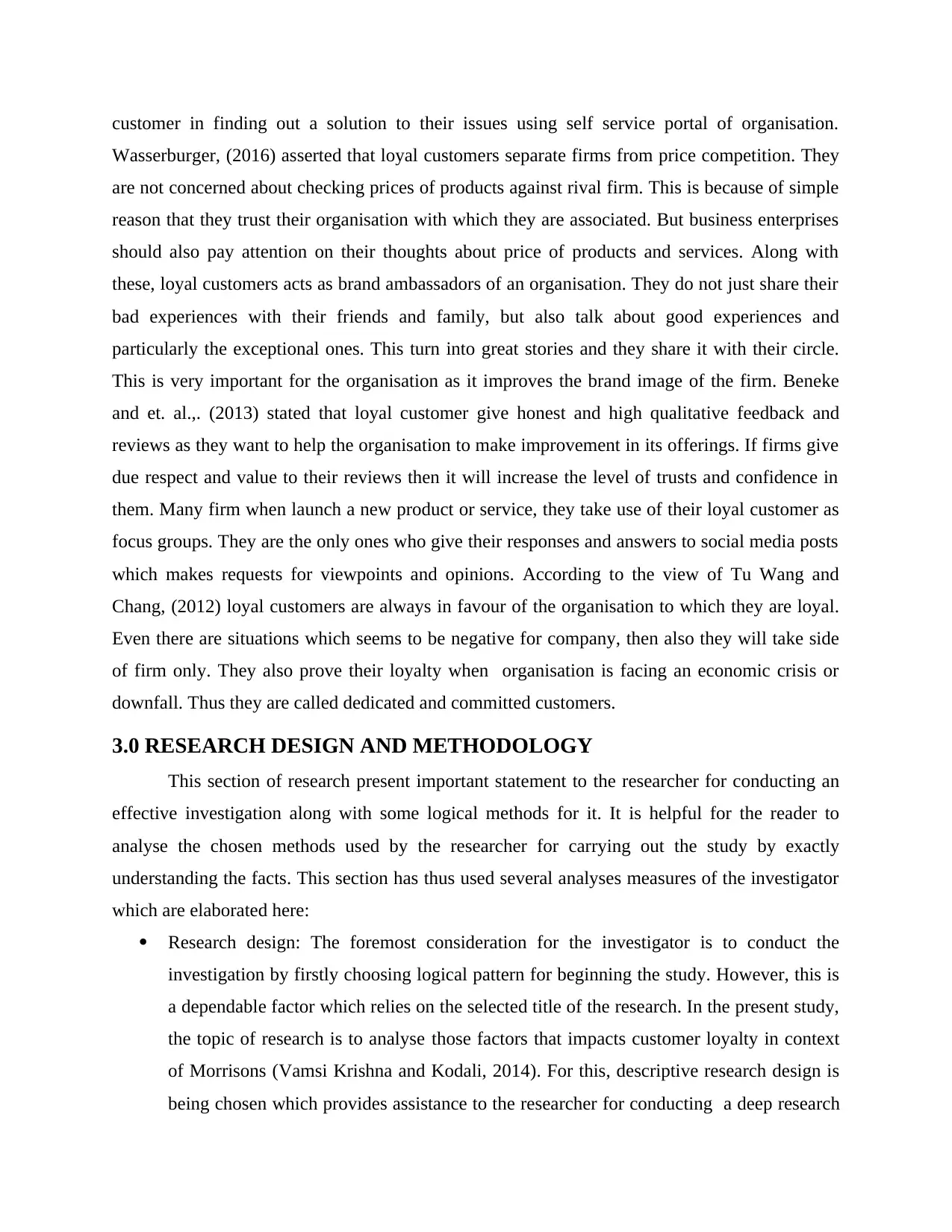
customer in finding out a solution to their issues using self service portal of organisation.
Wasserburger, (2016) asserted that loyal customers separate firms from price competition. They
are not concerned about checking prices of products against rival firm. This is because of simple
reason that they trust their organisation with which they are associated. But business enterprises
should also pay attention on their thoughts about price of products and services. Along with
these, loyal customers acts as brand ambassadors of an organisation. They do not just share their
bad experiences with their friends and family, but also talk about good experiences and
particularly the exceptional ones. This turn into great stories and they share it with their circle.
This is very important for the organisation as it improves the brand image of the firm. Beneke
and et. al.,. (2013) stated that loyal customer give honest and high qualitative feedback and
reviews as they want to help the organisation to make improvement in its offerings. If firms give
due respect and value to their reviews then it will increase the level of trusts and confidence in
them. Many firm when launch a new product or service, they take use of their loyal customer as
focus groups. They are the only ones who give their responses and answers to social media posts
which makes requests for viewpoints and opinions. According to the view of Tu Wang and
Chang, (2012) loyal customers are always in favour of the organisation to which they are loyal.
Even there are situations which seems to be negative for company, then also they will take side
of firm only. They also prove their loyalty when organisation is facing an economic crisis or
downfall. Thus they are called dedicated and committed customers.
3.0 RESEARCH DESIGN AND METHODOLOGY
This section of research present important statement to the researcher for conducting an
effective investigation along with some logical methods for it. It is helpful for the reader to
analyse the chosen methods used by the researcher for carrying out the study by exactly
understanding the facts. This section has thus used several analyses measures of the investigator
which are elaborated here:
Research design: The foremost consideration for the investigator is to conduct the
investigation by firstly choosing logical pattern for beginning the study. However, this is
a dependable factor which relies on the selected title of the research. In the present study,
the topic of research is to analyse those factors that impacts customer loyalty in context
of Morrisons (Vamsi Krishna and Kodali, 2014). For this, descriptive research design is
being chosen which provides assistance to the researcher for conducting a deep research
Wasserburger, (2016) asserted that loyal customers separate firms from price competition. They
are not concerned about checking prices of products against rival firm. This is because of simple
reason that they trust their organisation with which they are associated. But business enterprises
should also pay attention on their thoughts about price of products and services. Along with
these, loyal customers acts as brand ambassadors of an organisation. They do not just share their
bad experiences with their friends and family, but also talk about good experiences and
particularly the exceptional ones. This turn into great stories and they share it with their circle.
This is very important for the organisation as it improves the brand image of the firm. Beneke
and et. al.,. (2013) stated that loyal customer give honest and high qualitative feedback and
reviews as they want to help the organisation to make improvement in its offerings. If firms give
due respect and value to their reviews then it will increase the level of trusts and confidence in
them. Many firm when launch a new product or service, they take use of their loyal customer as
focus groups. They are the only ones who give their responses and answers to social media posts
which makes requests for viewpoints and opinions. According to the view of Tu Wang and
Chang, (2012) loyal customers are always in favour of the organisation to which they are loyal.
Even there are situations which seems to be negative for company, then also they will take side
of firm only. They also prove their loyalty when organisation is facing an economic crisis or
downfall. Thus they are called dedicated and committed customers.
3.0 RESEARCH DESIGN AND METHODOLOGY
This section of research present important statement to the researcher for conducting an
effective investigation along with some logical methods for it. It is helpful for the reader to
analyse the chosen methods used by the researcher for carrying out the study by exactly
understanding the facts. This section has thus used several analyses measures of the investigator
which are elaborated here:
Research design: The foremost consideration for the investigator is to conduct the
investigation by firstly choosing logical pattern for beginning the study. However, this is
a dependable factor which relies on the selected title of the research. In the present study,
the topic of research is to analyse those factors that impacts customer loyalty in context
of Morrisons (Vamsi Krishna and Kodali, 2014). For this, descriptive research design is
being chosen which provides assistance to the researcher for conducting a deep research
⊘ This is a preview!⊘
Do you want full access?
Subscribe today to unlock all pages.

Trusted by 1+ million students worldwide
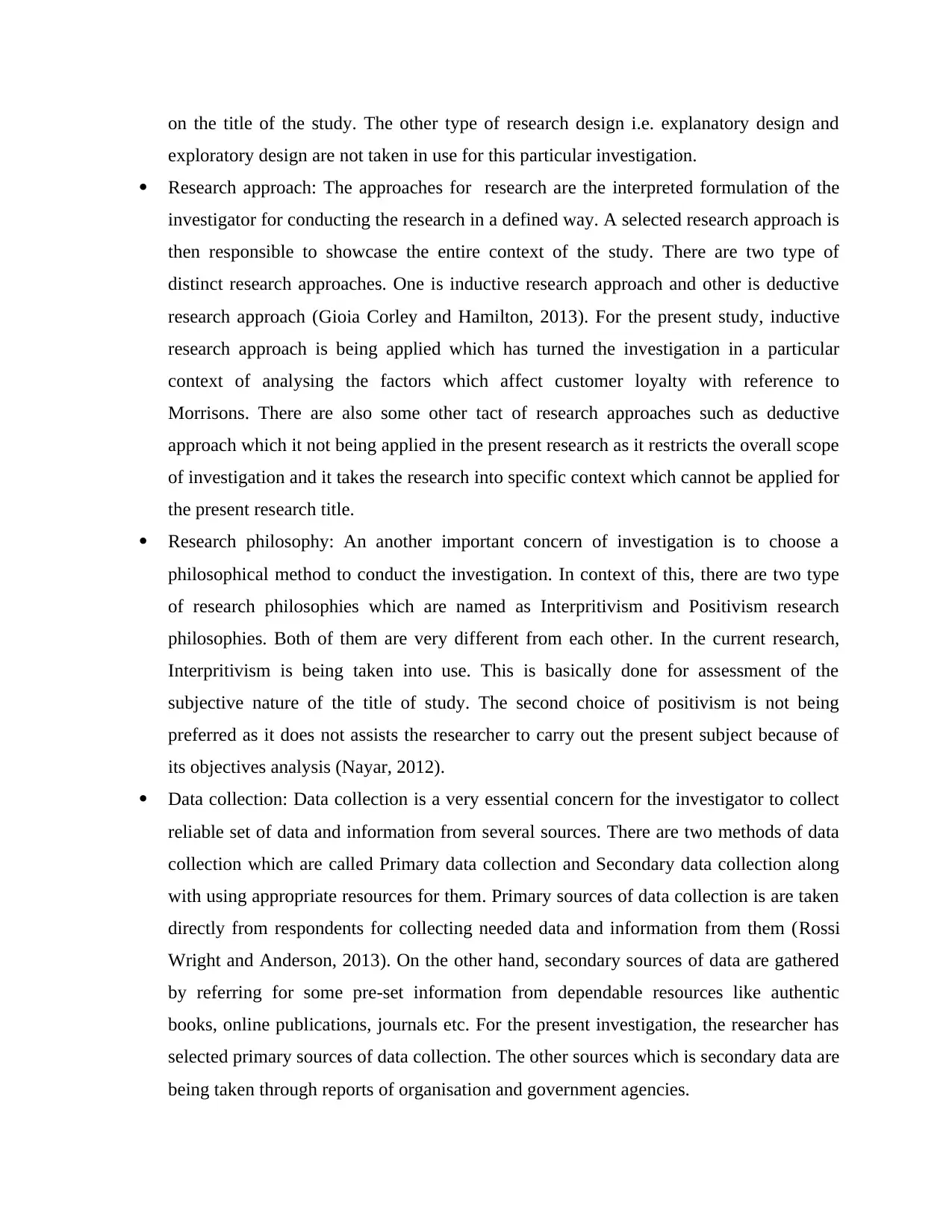
on the title of the study. The other type of research design i.e. explanatory design and
exploratory design are not taken in use for this particular investigation.
Research approach: The approaches for research are the interpreted formulation of the
investigator for conducting the research in a defined way. A selected research approach is
then responsible to showcase the entire context of the study. There are two type of
distinct research approaches. One is inductive research approach and other is deductive
research approach (Gioia Corley and Hamilton, 2013). For the present study, inductive
research approach is being applied which has turned the investigation in a particular
context of analysing the factors which affect customer loyalty with reference to
Morrisons. There are also some other tact of research approaches such as deductive
approach which it not being applied in the present research as it restricts the overall scope
of investigation and it takes the research into specific context which cannot be applied for
the present research title.
Research philosophy: An another important concern of investigation is to choose a
philosophical method to conduct the investigation. In context of this, there are two type
of research philosophies which are named as Interpritivism and Positivism research
philosophies. Both of them are very different from each other. In the current research,
Interpritivism is being taken into use. This is basically done for assessment of the
subjective nature of the title of study. The second choice of positivism is not being
preferred as it does not assists the researcher to carry out the present subject because of
its objectives analysis (Nayar, 2012).
Data collection: Data collection is a very essential concern for the investigator to collect
reliable set of data and information from several sources. There are two methods of data
collection which are called Primary data collection and Secondary data collection along
with using appropriate resources for them. Primary sources of data collection is are taken
directly from respondents for collecting needed data and information from them (Rossi
Wright and Anderson, 2013). On the other hand, secondary sources of data are gathered
by referring for some pre-set information from dependable resources like authentic
books, online publications, journals etc. For the present investigation, the researcher has
selected primary sources of data collection. The other sources which is secondary data are
being taken through reports of organisation and government agencies.
exploratory design are not taken in use for this particular investigation.
Research approach: The approaches for research are the interpreted formulation of the
investigator for conducting the research in a defined way. A selected research approach is
then responsible to showcase the entire context of the study. There are two type of
distinct research approaches. One is inductive research approach and other is deductive
research approach (Gioia Corley and Hamilton, 2013). For the present study, inductive
research approach is being applied which has turned the investigation in a particular
context of analysing the factors which affect customer loyalty with reference to
Morrisons. There are also some other tact of research approaches such as deductive
approach which it not being applied in the present research as it restricts the overall scope
of investigation and it takes the research into specific context which cannot be applied for
the present research title.
Research philosophy: An another important concern of investigation is to choose a
philosophical method to conduct the investigation. In context of this, there are two type
of research philosophies which are named as Interpritivism and Positivism research
philosophies. Both of them are very different from each other. In the current research,
Interpritivism is being taken into use. This is basically done for assessment of the
subjective nature of the title of study. The second choice of positivism is not being
preferred as it does not assists the researcher to carry out the present subject because of
its objectives analysis (Nayar, 2012).
Data collection: Data collection is a very essential concern for the investigator to collect
reliable set of data and information from several sources. There are two methods of data
collection which are called Primary data collection and Secondary data collection along
with using appropriate resources for them. Primary sources of data collection is are taken
directly from respondents for collecting needed data and information from them (Rossi
Wright and Anderson, 2013). On the other hand, secondary sources of data are gathered
by referring for some pre-set information from dependable resources like authentic
books, online publications, journals etc. For the present investigation, the researcher has
selected primary sources of data collection. The other sources which is secondary data are
being taken through reports of organisation and government agencies.
Paraphrase This Document
Need a fresh take? Get an instant paraphrase of this document with our AI Paraphraser
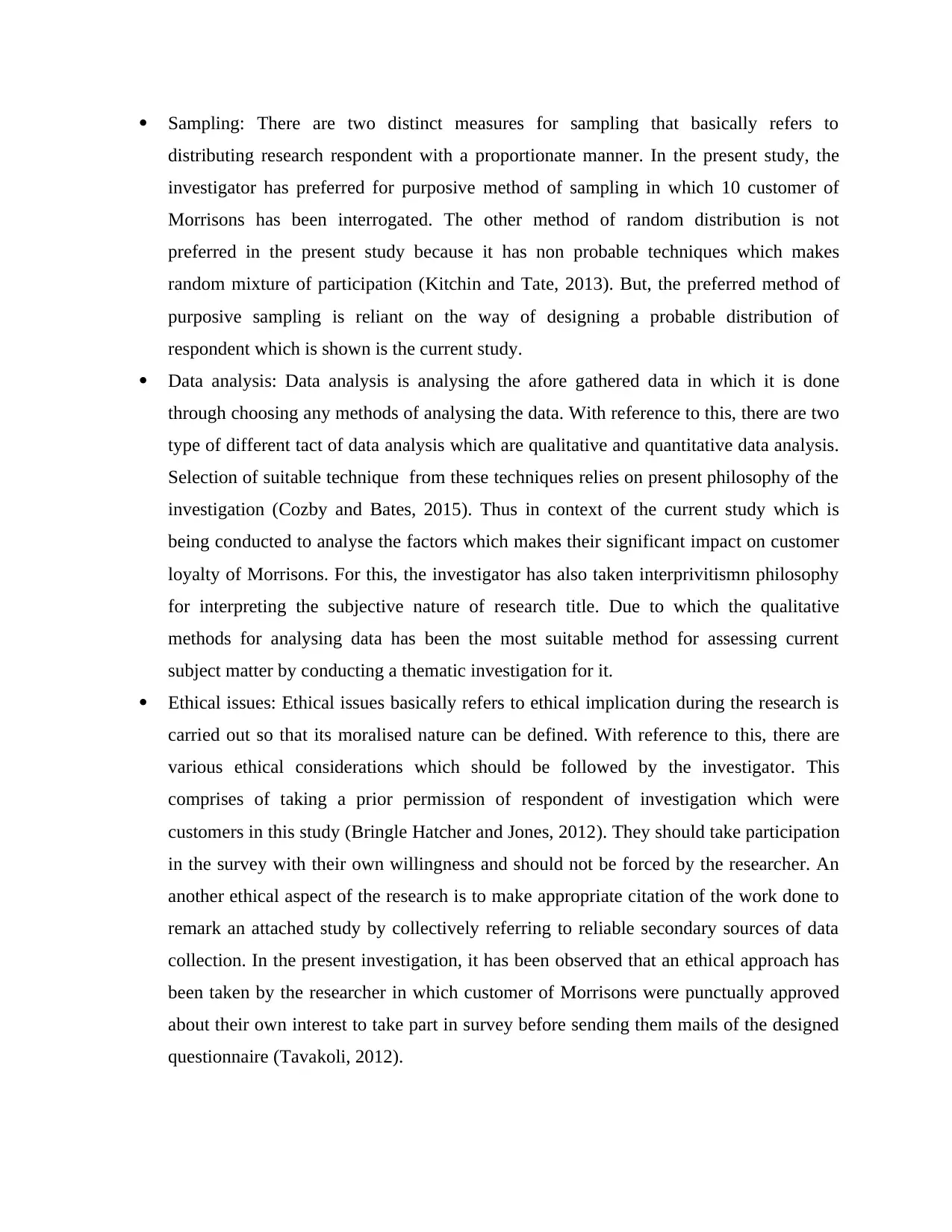
Sampling: There are two distinct measures for sampling that basically refers to
distributing research respondent with a proportionate manner. In the present study, the
investigator has preferred for purposive method of sampling in which 10 customer of
Morrisons has been interrogated. The other method of random distribution is not
preferred in the present study because it has non probable techniques which makes
random mixture of participation (Kitchin and Tate, 2013). But, the preferred method of
purposive sampling is reliant on the way of designing a probable distribution of
respondent which is shown is the current study.
Data analysis: Data analysis is analysing the afore gathered data in which it is done
through choosing any methods of analysing the data. With reference to this, there are two
type of different tact of data analysis which are qualitative and quantitative data analysis.
Selection of suitable technique from these techniques relies on present philosophy of the
investigation (Cozby and Bates, 2015). Thus in context of the current study which is
being conducted to analyse the factors which makes their significant impact on customer
loyalty of Morrisons. For this, the investigator has also taken interprivitismn philosophy
for interpreting the subjective nature of research title. Due to which the qualitative
methods for analysing data has been the most suitable method for assessing current
subject matter by conducting a thematic investigation for it.
Ethical issues: Ethical issues basically refers to ethical implication during the research is
carried out so that its moralised nature can be defined. With reference to this, there are
various ethical considerations which should be followed by the investigator. This
comprises of taking a prior permission of respondent of investigation which were
customers in this study (Bringle Hatcher and Jones, 2012). They should take participation
in the survey with their own willingness and should not be forced by the researcher. An
another ethical aspect of the research is to make appropriate citation of the work done to
remark an attached study by collectively referring to reliable secondary sources of data
collection. In the present investigation, it has been observed that an ethical approach has
been taken by the researcher in which customer of Morrisons were punctually approved
about their own interest to take part in survey before sending them mails of the designed
questionnaire (Tavakoli, 2012).
distributing research respondent with a proportionate manner. In the present study, the
investigator has preferred for purposive method of sampling in which 10 customer of
Morrisons has been interrogated. The other method of random distribution is not
preferred in the present study because it has non probable techniques which makes
random mixture of participation (Kitchin and Tate, 2013). But, the preferred method of
purposive sampling is reliant on the way of designing a probable distribution of
respondent which is shown is the current study.
Data analysis: Data analysis is analysing the afore gathered data in which it is done
through choosing any methods of analysing the data. With reference to this, there are two
type of different tact of data analysis which are qualitative and quantitative data analysis.
Selection of suitable technique from these techniques relies on present philosophy of the
investigation (Cozby and Bates, 2015). Thus in context of the current study which is
being conducted to analyse the factors which makes their significant impact on customer
loyalty of Morrisons. For this, the investigator has also taken interprivitismn philosophy
for interpreting the subjective nature of research title. Due to which the qualitative
methods for analysing data has been the most suitable method for assessing current
subject matter by conducting a thematic investigation for it.
Ethical issues: Ethical issues basically refers to ethical implication during the research is
carried out so that its moralised nature can be defined. With reference to this, there are
various ethical considerations which should be followed by the investigator. This
comprises of taking a prior permission of respondent of investigation which were
customers in this study (Bringle Hatcher and Jones, 2012). They should take participation
in the survey with their own willingness and should not be forced by the researcher. An
another ethical aspect of the research is to make appropriate citation of the work done to
remark an attached study by collectively referring to reliable secondary sources of data
collection. In the present investigation, it has been observed that an ethical approach has
been taken by the researcher in which customer of Morrisons were punctually approved
about their own interest to take part in survey before sending them mails of the designed
questionnaire (Tavakoli, 2012).
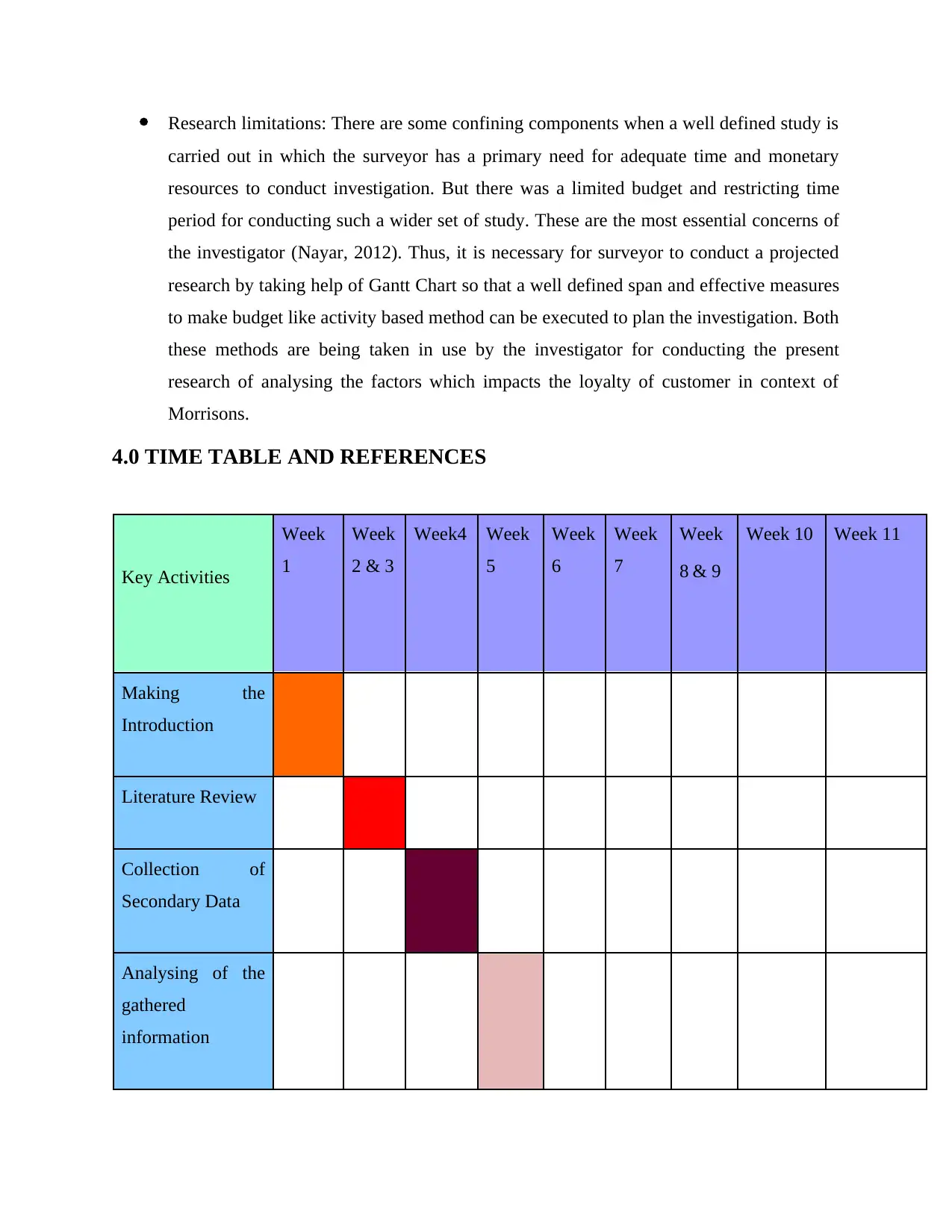
Research limitations: There are some confining components when a well defined study is
carried out in which the surveyor has a primary need for adequate time and monetary
resources to conduct investigation. But there was a limited budget and restricting time
period for conducting such a wider set of study. These are the most essential concerns of
the investigator (Nayar, 2012). Thus, it is necessary for surveyor to conduct a projected
research by taking help of Gantt Chart so that a well defined span and effective measures
to make budget like activity based method can be executed to plan the investigation. Both
these methods are being taken in use by the investigator for conducting the present
research of analysing the factors which impacts the loyalty of customer in context of
Morrisons.
4.0 TIME TABLE AND REFERENCES
Key Activities
Week
1
Week
2 & 3
Week4 Week
5
Week
6
Week
7
Week
8 & 9
Week 10 Week 11
Making the
Introduction
Literature Review
Collection of
Secondary Data
Analysing of the
gathered
information
carried out in which the surveyor has a primary need for adequate time and monetary
resources to conduct investigation. But there was a limited budget and restricting time
period for conducting such a wider set of study. These are the most essential concerns of
the investigator (Nayar, 2012). Thus, it is necessary for surveyor to conduct a projected
research by taking help of Gantt Chart so that a well defined span and effective measures
to make budget like activity based method can be executed to plan the investigation. Both
these methods are being taken in use by the investigator for conducting the present
research of analysing the factors which impacts the loyalty of customer in context of
Morrisons.
4.0 TIME TABLE AND REFERENCES
Key Activities
Week
1
Week
2 & 3
Week4 Week
5
Week
6
Week
7
Week
8 & 9
Week 10 Week 11
Making the
Introduction
Literature Review
Collection of
Secondary Data
Analysing of the
gathered
information
⊘ This is a preview!⊘
Do you want full access?
Subscribe today to unlock all pages.

Trusted by 1+ million students worldwide
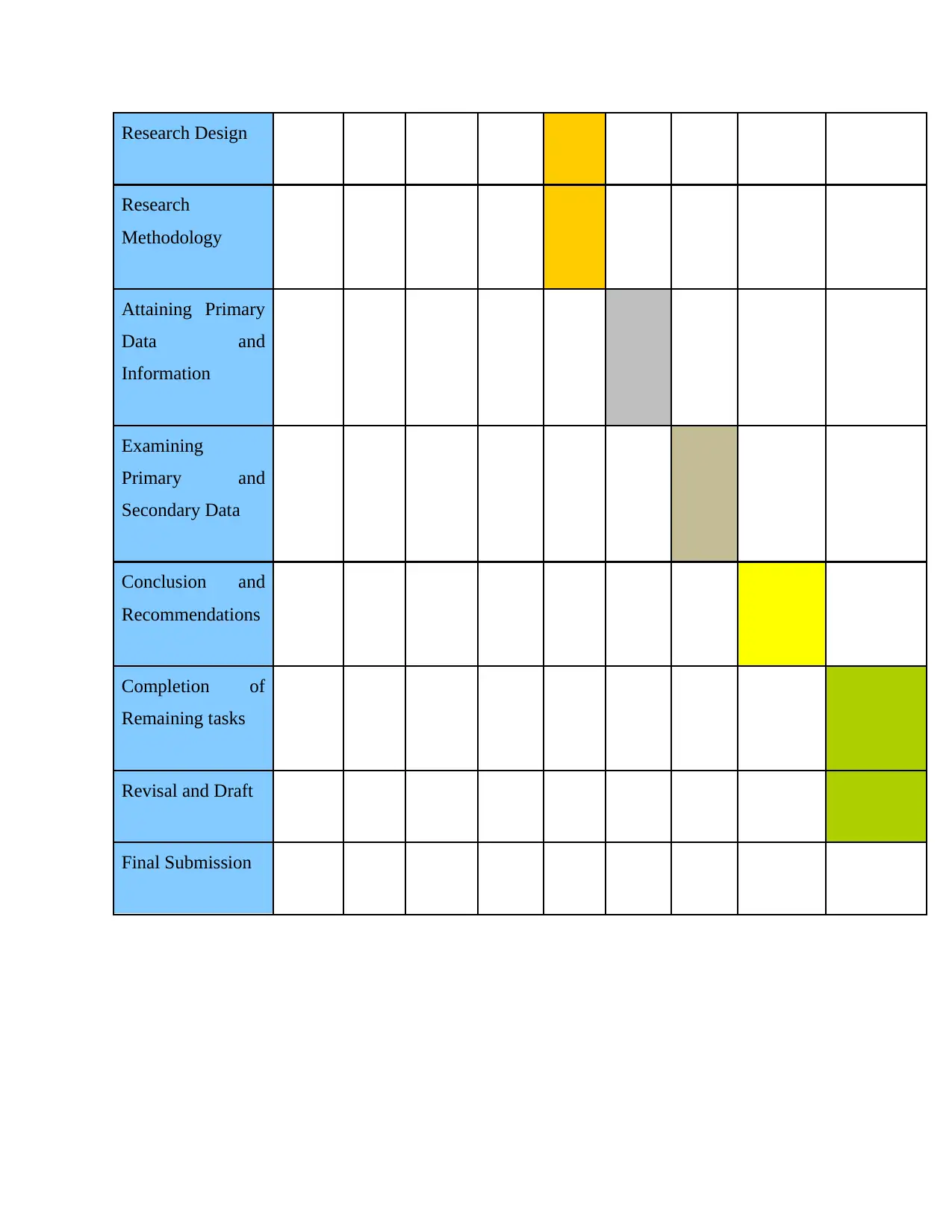
Research Design
Research
Methodology
Attaining Primary
Data and
Information
Examining
Primary and
Secondary Data
Conclusion and
Recommendations
Completion of
Remaining tasks
Revisal and Draft
Final Submission
Research
Methodology
Attaining Primary
Data and
Information
Examining
Primary and
Secondary Data
Conclusion and
Recommendations
Completion of
Remaining tasks
Revisal and Draft
Final Submission
Paraphrase This Document
Need a fresh take? Get an instant paraphrase of this document with our AI Paraphraser
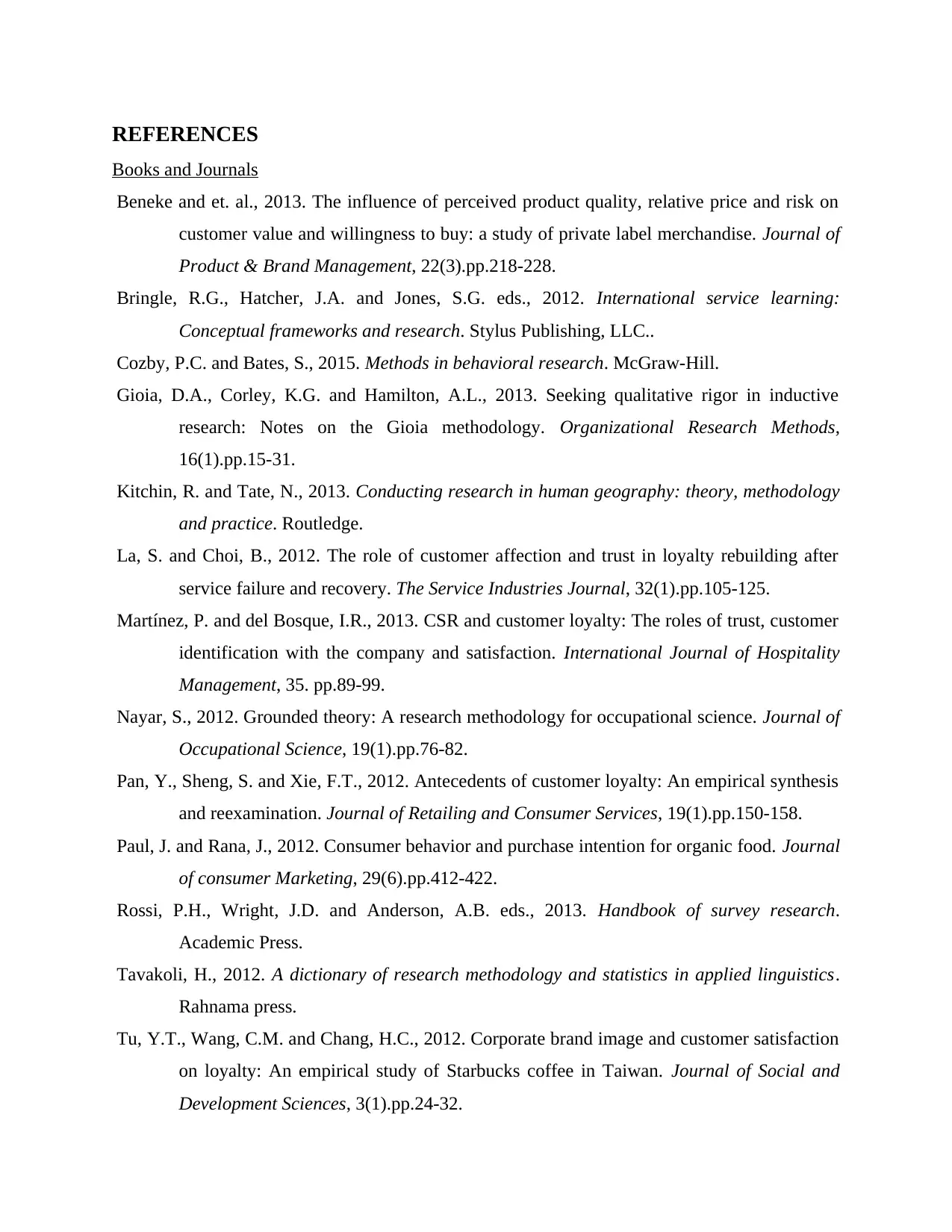
REFERENCES
Books and Journals
Beneke and et. al., 2013. The influence of perceived product quality, relative price and risk on
customer value and willingness to buy: a study of private label merchandise. Journal of
Product & Brand Management, 22(3).pp.218-228.
Bringle, R.G., Hatcher, J.A. and Jones, S.G. eds., 2012. International service learning:
Conceptual frameworks and research. Stylus Publishing, LLC..
Cozby, P.C. and Bates, S., 2015. Methods in behavioral research. McGraw-Hill.
Gioia, D.A., Corley, K.G. and Hamilton, A.L., 2013. Seeking qualitative rigor in inductive
research: Notes on the Gioia methodology. Organizational Research Methods,
16(1).pp.15-31.
Kitchin, R. and Tate, N., 2013. Conducting research in human geography: theory, methodology
and practice. Routledge.
La, S. and Choi, B., 2012. The role of customer affection and trust in loyalty rebuilding after
service failure and recovery. The Service Industries Journal, 32(1).pp.105-125.
Martínez, P. and del Bosque, I.R., 2013. CSR and customer loyalty: The roles of trust, customer
identification with the company and satisfaction. International Journal of Hospitality
Management, 35. pp.89-99.
Nayar, S., 2012. Grounded theory: A research methodology for occupational science. Journal of
Occupational Science, 19(1).pp.76-82.
Pan, Y., Sheng, S. and Xie, F.T., 2012. Antecedents of customer loyalty: An empirical synthesis
and reexamination. Journal of Retailing and Consumer Services, 19(1).pp.150-158.
Paul, J. and Rana, J., 2012. Consumer behavior and purchase intention for organic food. Journal
of consumer Marketing, 29(6).pp.412-422.
Rossi, P.H., Wright, J.D. and Anderson, A.B. eds., 2013. Handbook of survey research.
Academic Press.
Tavakoli, H., 2012. A dictionary of research methodology and statistics in applied linguistics.
Rahnama press.
Tu, Y.T., Wang, C.M. and Chang, H.C., 2012. Corporate brand image and customer satisfaction
on loyalty: An empirical study of Starbucks coffee in Taiwan. Journal of Social and
Development Sciences, 3(1).pp.24-32.
Books and Journals
Beneke and et. al., 2013. The influence of perceived product quality, relative price and risk on
customer value and willingness to buy: a study of private label merchandise. Journal of
Product & Brand Management, 22(3).pp.218-228.
Bringle, R.G., Hatcher, J.A. and Jones, S.G. eds., 2012. International service learning:
Conceptual frameworks and research. Stylus Publishing, LLC..
Cozby, P.C. and Bates, S., 2015. Methods in behavioral research. McGraw-Hill.
Gioia, D.A., Corley, K.G. and Hamilton, A.L., 2013. Seeking qualitative rigor in inductive
research: Notes on the Gioia methodology. Organizational Research Methods,
16(1).pp.15-31.
Kitchin, R. and Tate, N., 2013. Conducting research in human geography: theory, methodology
and practice. Routledge.
La, S. and Choi, B., 2012. The role of customer affection and trust in loyalty rebuilding after
service failure and recovery. The Service Industries Journal, 32(1).pp.105-125.
Martínez, P. and del Bosque, I.R., 2013. CSR and customer loyalty: The roles of trust, customer
identification with the company and satisfaction. International Journal of Hospitality
Management, 35. pp.89-99.
Nayar, S., 2012. Grounded theory: A research methodology for occupational science. Journal of
Occupational Science, 19(1).pp.76-82.
Pan, Y., Sheng, S. and Xie, F.T., 2012. Antecedents of customer loyalty: An empirical synthesis
and reexamination. Journal of Retailing and Consumer Services, 19(1).pp.150-158.
Paul, J. and Rana, J., 2012. Consumer behavior and purchase intention for organic food. Journal
of consumer Marketing, 29(6).pp.412-422.
Rossi, P.H., Wright, J.D. and Anderson, A.B. eds., 2013. Handbook of survey research.
Academic Press.
Tavakoli, H., 2012. A dictionary of research methodology and statistics in applied linguistics.
Rahnama press.
Tu, Y.T., Wang, C.M. and Chang, H.C., 2012. Corporate brand image and customer satisfaction
on loyalty: An empirical study of Starbucks coffee in Taiwan. Journal of Social and
Development Sciences, 3(1).pp.24-32.
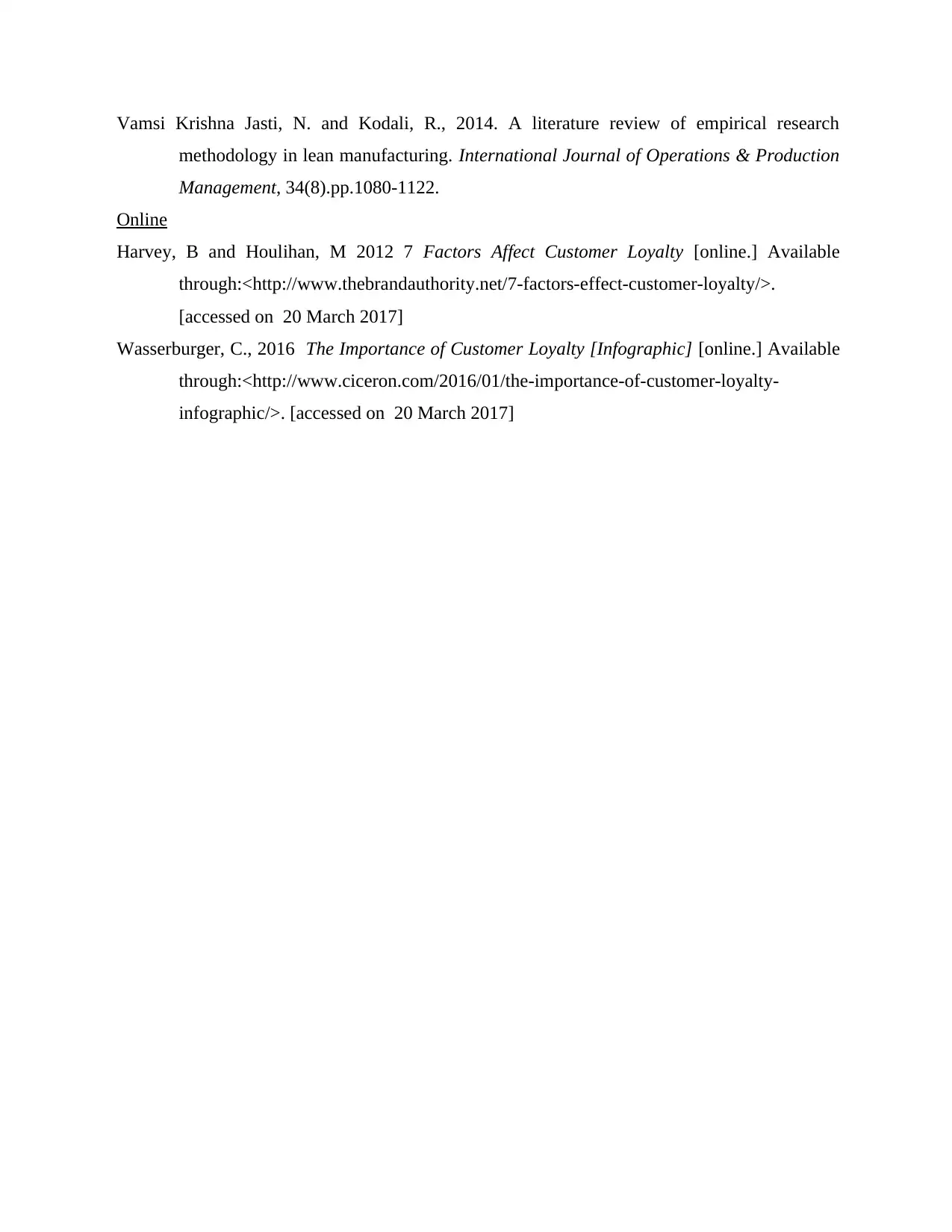
Vamsi Krishna Jasti, N. and Kodali, R., 2014. A literature review of empirical research
methodology in lean manufacturing. International Journal of Operations & Production
Management, 34(8).pp.1080-1122.
Online
Harvey, B and Houlihan, M 2012 7 Factors Affect Customer Loyalty [online.] Available
through:<http://www.thebrandauthority.net/7-factors-effect-customer-loyalty/>.
[accessed on 20 March 2017]
Wasserburger, C., 2016 The Importance of Customer Loyalty [Infographic] [online.] Available
through:<http://www.ciceron.com/2016/01/the-importance-of-customer-loyalty-
infographic/>. [accessed on 20 March 2017]
methodology in lean manufacturing. International Journal of Operations & Production
Management, 34(8).pp.1080-1122.
Online
Harvey, B and Houlihan, M 2012 7 Factors Affect Customer Loyalty [online.] Available
through:<http://www.thebrandauthority.net/7-factors-effect-customer-loyalty/>.
[accessed on 20 March 2017]
Wasserburger, C., 2016 The Importance of Customer Loyalty [Infographic] [online.] Available
through:<http://www.ciceron.com/2016/01/the-importance-of-customer-loyalty-
infographic/>. [accessed on 20 March 2017]
⊘ This is a preview!⊘
Do you want full access?
Subscribe today to unlock all pages.

Trusted by 1+ million students worldwide
1 out of 13
Related Documents
Your All-in-One AI-Powered Toolkit for Academic Success.
+13062052269
info@desklib.com
Available 24*7 on WhatsApp / Email
![[object Object]](/_next/static/media/star-bottom.7253800d.svg)
Unlock your academic potential
Copyright © 2020–2026 A2Z Services. All Rights Reserved. Developed and managed by ZUCOL.





